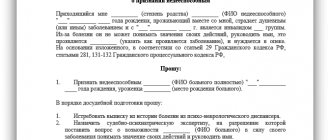Guardianship has found wide application in our country. The current legislation of Russia provides several grounds for the implementation of guardianship over parents or over a pensioner who are capable citizens. Let's try to figure out, as an example, how to obtain guardianship over a mother. There are the following possibilities for applying the patronage procedure:
- Properly formalize her request if, for health reasons, she is unable to perform civil duties and exercise her own rights. It is recommended that the request be certified by a notary or the relevant body that deals with guardianship and guardianship issues.
- Appointment of a guardian over her through the appropriate body that deals with guardianship and guardianship issues. In this situation, it is necessary to obtain the mother’s consent to represent her interests by children.
- Availability of a signed agency agreement. In this case, all actions are performed by the son or daughter, but with the consent of the mother. It is also recommended to have the agency agreement certified by a notary.
Law
When establishing guardianship, it is necessary to take into account civil law and procedural rules on depriving a person of legal capacity - Art. 21 Civil Code of the Russian Federation, ch. 31 Code of Civil Procedure of the Russian Federation.
The provisions on guardianship are established by the Civil Code of the Russian Federation - Art. 31-34.
More detailed reasons for the appointment and termination of this form of social structure are indicated in Federal Law No. 48 “On guardianship and trusteeship.”
Conditions
Guardianship of the mother is possible for an adult, legally capable son or daughter. Under exceptional conditions, this form of social structure is allowed with the participation of several children.
The guardian must live with the ward and provide all the conditions necessary to provide him with social, household, medical and other assistance.
Guardianship involves taking care of a citizen's property.
When submitting an application, you must make an inventory of all valuables in duplicate, preferably in the presence of two witnesses. Property management can be entrusted under a trust management agreement.
The guardian has the right to dispose of the pension and other income of the incapacitated mother, and spend it only on her maintenance.
Medical indications
Establishing guardianship requires a certificate of health of the guardian and ward.
The intervention of doctors is necessary during legal proceedings, the purpose of which is to declare an elderly person incompetent.
The examination takes place on an outpatient basis or, more often, in an inpatient setting.
A legal fact may precede an application for forced hospitalization of a citizen in a psychiatric hospital - according to the rules of the Code of Administrative Proceedings (Article 276 of the Code of Arbitration Procedures of the Russian Federation).
An expert’s opinion may become the basis for a court to make a decision recognizing a person’s incompetence. This is considered the basis for applying to social authorities to establish guardianship, including over an incapacitated mother.
Capacity
Legal capacity allows a citizen to enter into transactions and dispose of his property at his personal discretion. If it is deprived, a person loses the right to make transactions, sell, buy things, and manage their own income.
For property damage to other people caused by an incapacitated citizen, his guardian is responsible.
Deprivation of legal capacity is possible only in court, with the participation of the prosecutor and, if necessary, the guardianship authorities.
It is advisable to deprive a person of legal capacity, especially a close relative, only if this is necessary for the benefit of the citizen himself, for example, for the purpose of rational management of the property of a mentally ill person and preventing an attempt on the property of a sick person by fraudsters.
Legal capacity is a prerequisite for establishing guardianship, regardless of the degree of relationship between the guardian and the ward.
Who can become a guardian
According to Art. 35 of the Civil Code of the Russian Federation, any adult capable person who has undergone special training and approved by the guardianship authorities has the right to formalize guardianship over the mother or father. Please note that, according to Part 5 of Art. 10 Federal Law No. 48, children in this case have a priority right to obtain guardianship over their parents over other entities who are not close relatives.
As part of this process, the moral qualities of the person are taken into account, as well as his ability to perform guardianship functions and relationships with the potential ward. However, children will not be able to become guardians if they:
- were previously deprived of parental or guardianship rights;
- have an outstanding conviction for crimes against life and health, as well as other grave and especially grave crimes;
- do not have the financial or housing ability to care for a parent;
- pursue mercantile goals when registering guardianship;
- suffer from diseases that prevent the establishment of guardianship, and so on.
Requirements
In 2020, a guardian can be an adult capable citizen of Russia. Guardians may be citizens who have not been convicted of serious crimes, who are capable and financially independent. The guardian must have free living space or live in the living space of the ward mother.
Priority is given to a caregiver who has a regular job. What matters is the moral qualities of the guardian, his willingness to care for the parent, regardless of material gain.
Rights and obligations
They are established by Art. 15 Federal Law No. 48. The guardian must take care of the ward mother and provide her with the necessary support.
The guardian is required to regularly report on the work performed. He must no later than February 1 of each year:
- provide a detailed report on the care of the guardian;
- Attach to the document a detailed inventory of the property, necessary receipts and receipts for expenses.
A sample guardian report is here.
The guardian has the right to enter into transactions on behalf of the ward, manage his property and expenses.
To conduct transactions on real estate and aimed at reducing the property of the ward, the consent of the guardianship and trusteeship authorities is required.
Alimony for joint custody
Child support obligations in joint custody also cause a lot of controversy, if the child lives with his parents in turns. By law, child support is paid by the parent living separately. The one who lives with the minor receives them, but can only spend them on his maintenance.
Be sure to read it! Attribution of authorship: what is the penalty for plagiarism?
The easiest way is to draw up an agreement on the exercise of parental rights and indicate that child support will be paid monthly by the parent who lives separately at the time of payment.
Example: The spouses agreed that the son would live with each of them after the divorce in turn: two months with the mother, two months with the father. While the child lives with his mother, alimony in the amount of 25% of the salary is paid by the father. When he moves to his father, alimony in the same amount is paid by his mother.
Guardianship of mother
Children have a duty of care to their parents, regardless of legal guardianship. Kinship is not considered a determining factor in establishing guardianship, although this is necessarily taken into account when choosing a guardian.
The activities of a guardian are carried out free of charge and are not aimed at obtaining material benefits.
Sick
Guardianship can be established over a person who does not have a physical health problem. The key factor in establishing such a form of social structure will be the presence of a court decision on incapacity.
The guardian is obliged to bear the costs of maintaining the ward. The money is spent from the personal budget or from the income of the incapacitated mother.
The Child Guardianship Law regulates all issues regarding registration. Need a sample application for guardianship of an incapacitated person? See here.
Elderly (after 80 years)
Age is also not considered a determining factor when establishing guardianship. For caring for an elderly person, regardless of relationship, payments are due, but if the guardian does not have a permanent job.
The procedure for assigning payments is established by Government Decree dated June 4, 2007.
Incapacitated
Guardianship is established over an incapacitated mother. If you have legal capacity, patronage is possible. It involves voluntary assistance to a disabled but capable person in protecting their rights.
Patronage is established with the permission of the guardianship and trusteeship authority and involves the conclusion of an agency or trust management agreement.
Patronage is possible only with the consent of all parties to participation in this form of social structure.
Benefits for guardians
The law does not provide for any special benefits for guardians of incapacitated citizens other than the above payments. Any state guarantees are established only in relation to the incapacitated wards themselves. Additional guarantees can only be established by the legislation of the constituent entities of the federation.
In particular, in certain regions the following provisions are provided for guardians:
- transport tax benefits established at the regional level;
- benefits for medicines and medical supplies;
- free legal assistance;
- benefits when paying state duties;
- discounts on utility bills and so on.
Please note that more state preferences are provided for persons performing guardianship functions in relation to orphans or disabled children. We recommend that you familiarize yourself with the benefits for caregivers in more detail.
How to apply?
How to obtain guardianship over your mother is a question whose solution requires contacting the guardianship authorities. This can be done immediately after the court decision on the mother’s incapacity comes into force.
To apply, you need to collect the necessary documents and write an application.
Where?
You can submit an application to the guardianship department at the mother’s place of residence.
It is possible to submit an application at the place of residence of the guardian if he agrees to accommodate the mother in his living space.
Required documents
To establish guardianship, the following documents must be provided:
- passport of the candidate for guardianship and the ward himself;
- inventory of the ward's property;
- medical report on the health status of the ward;
- certificate confirming that the guardian does not have mental illness;
- certificate of good conduct;
- an inventory of the guardian's property, with copies of title documents;
- court decision on a citizen's incapacity;
- certificate of income of the guardian and ward.
Employees of the guardianship authorities conduct an examination of the guardian’s living conditions and are interested in his lifestyle and employment. It is also mandatory to provide an autobiography of the guardian.
Submitting an application
It is submitted in person when contacting the guardianship authorities.
The application must contain:
- information about the guardian, ward;
- information about the mother's incapacity;
- other important information, for example, motivation for guardianship, information about property.
The period for consideration of the application and making a decision is 15 days from the date of submission of the document.
A sample application for guardianship of an elderly person is here.
About the masters of fate
About the girl Nastya Terekhova-Jallul.
This is life, what can you do?
Nastya had a difficult fate, but she lived in a loving family of people who considered her their own. And even when they found out that she was not theirs, it didn’t change anything.
She grew up with her grandmother, whom she called mom, because her mother died when she was just over a year old, I’m not sure that she remembered her.
Lived in a civil marriage with his wife.
She died after giving birth. Now I can't get a baby born on August 13th.
The mother’s documents were lost; she had a temporary certificate. Now the child is not even given to the grandmother.
In the child’s documents there is a dash in the columns “mother” and “father,” said Nizhny Tagil resident Albert.
As the lawyer involved in transferring the child to the guardianship authorities told the man, he could prove his paternity only through the court.
Payments
Guardianship is free of charge. A compensation payment is possible if an unemployed guardian takes care of a mother who is a disabled person of group 1, recognized as disabled by a commission of doctors in a medical institution, or if an elderly person is over 80 years old.
Payments are added to the mother's pension. For money, you need to contact the pension fund, collecting the necessary documents confirming the applicant’s age, disability, and lack of income.
Read what documents are needed for guardianship of an 80-year-old elderly person. What are the conditions for obtaining guardianship of a child? Information here.
What is the difference between guardianship and adoption of a child? Details in this article.
Who exercises control?
It is possible according to Chap. 5 Federal Law No. 48. Control is exercised by guardianship authorities. They have the right to conduct unscheduled inspections, visit the ward, and inquire about the condition of his property.
If abuse on the part of the guardian and signs of crime are detected, the guardianship authorities are obliged to apply to the court and other law enforcement agencies to protect the rights of the ward mother.
Guardianship of the mother should not be justified by selfish goals. Clause 1 Art. 87 of the RF IC obliges adult able-bodied children to support their disabled parents who need support.
Regardless of guardianship, a disabled mother has the right to receive alimony from her children, regardless of their current legal status.
Disagreements regarding guardianship or alimony support for a needy incapacitated mother are resolved through contractual or judicial procedures.
Rights and responsibilities of a guardian
To obtain guardianship over the father of a single mother, you should familiarize yourself with the range of rights and obligations outlined in the provisions of Art. 36 Civil Code, as well as Art. 15 Federal Law No. 48. According to them, the duties of a guardian include:
- cohabitation with the ward, except in cases where separation is permitted by the guardianship authorities and does not contradict the interests of the ward;
- protection of the rights and interests of the ward, execution of legally significant actions on his behalf;
- care for the maintenance, care and treatment of the parent;
- assistance in restoring capacity;
- taking into account the opinion of the ward when performing guardianship duties;
- conscientious management, protection and disposal of the property of the ward, and so on.
In addition, children who are guardians of their parents have rights, which include:
- use of the ward's funds in his interests;
- receiving state-guaranteed payments and benefits;
- going to court to recognize the parent as legally competent;
- voluntary refusal to exercise guardianship powers, and so on.
Learn more about the rights and responsibilities of a guardian.










